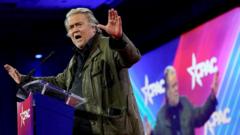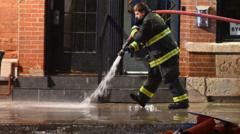The election of Pope Leo XIV, an American born in Chicago, has created ripples within the MAGA movement as key supporters express disappointment with the Pope's liberal leanings. Pundits foresee potential conflicts with President Trump over issues such as immigration, which the new Pope has previously criticized.
American Pope Sparks Controversy with Trump Loyalists

American Pope Sparks Controversy with Trump Loyalists
Pope Leo XIV's election raises concerns among Donald Trump's supporters who fear a clash of values, particularly on immigration and social issues.
The recently elected Pope Leo XIV, born Robert Francis Prevost in Chicago, has stirred controversy among Donald Trump's Make America Great Again (MAGA) supporters, who are wary that the first American pontiff may not align with their "America First" agenda. While Pope Leo's political views remain largely uncharted, his past expressions of concern for immigrants and the poor suggest a lean towards progressive policies, creating friction among conservatives.
Former White House strategist Steve Bannon voiced strong apprehensions about Pope Leo's election, indicating it could signal an ideological conflict with Trump. He noted that the Pope's history of critical statements aimed at U.S. political figures and immigration policies poses a challenge to the Trump administration. Bannon predicted "definitely going to be friction" between Pope Leo and Trump, highlighting a potential divide in the Catholic Church's American representation.
In the wake of the election, the President responded minimally, calling it a "great honour," while Trump's ardent supporters began publicly criticizing Pope Leo. Some believe that the Pope's allegiance to a more liberal agenda mirrors that of his predecessor, Pope Francis. The sentiment among many Catholics in Chicago leans towards a hope that Pope Leo will carry forward Francis's work on issues such as immigration.
Despite the concerns of a segment of MAGA supporters, the wider Catholic population in the U.S. appears less homogenous. Recent Pew Research surveys show about 20% of Americans identify as Catholics, and a significant portion of these individuals hold varying political views. While Democratic Catholics, including Presidents John F. Kennedy and Joe Biden, have historically shaped the party, many American Catholics support the theories promoted by Pope Francis regarding climate change, social justice, and immigration ethics.
Critics of the new Pope, including influential conservative commentators, have focused on his past social media posts, particularly those criticizing part of the Trump administration's immigration policies. Some pundits assert Pope Leo's appointment was a politically motivated message directed at Trump.
Bannon and other hard-right supporters have begun to brand Pope Leo as "anti-Trump" and "pro-open borders," fears that the new Pope will continue the modern Catholic Church's inclination toward a more progressive agenda. These perspectives reflect the ongoing struggle within American Catholicism as the Church grapples with its relationship to contemporary political landscapes.
As Pope Leo XIV begins his papacy, the full implications of his leadership style and policy priorities remain to be seen. Observers will be keen to gauge his actions concerning the polarized climate of U.S. politics and how his stance will maneuver between liberal and conservative factions within both the Church and American society at large.






















